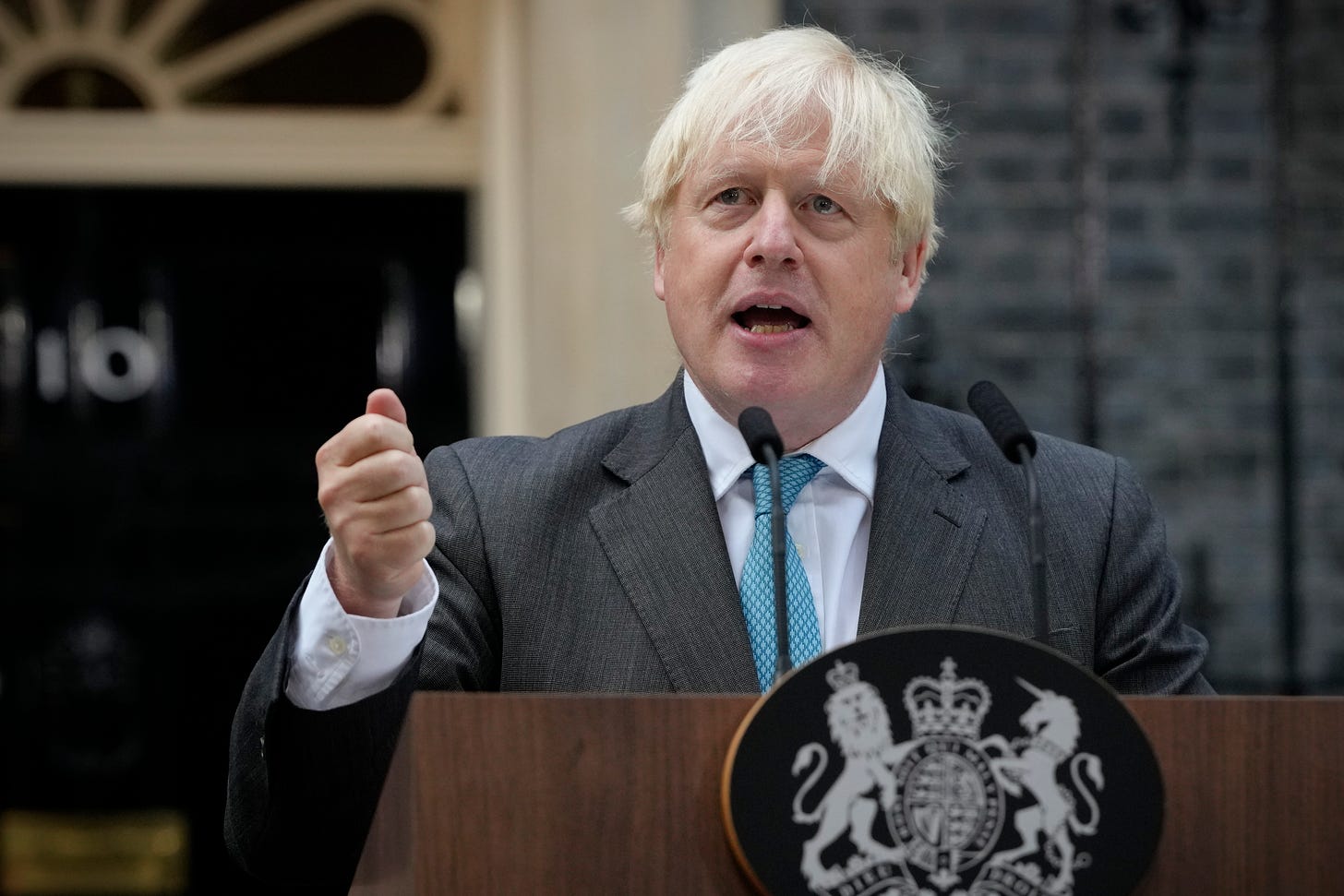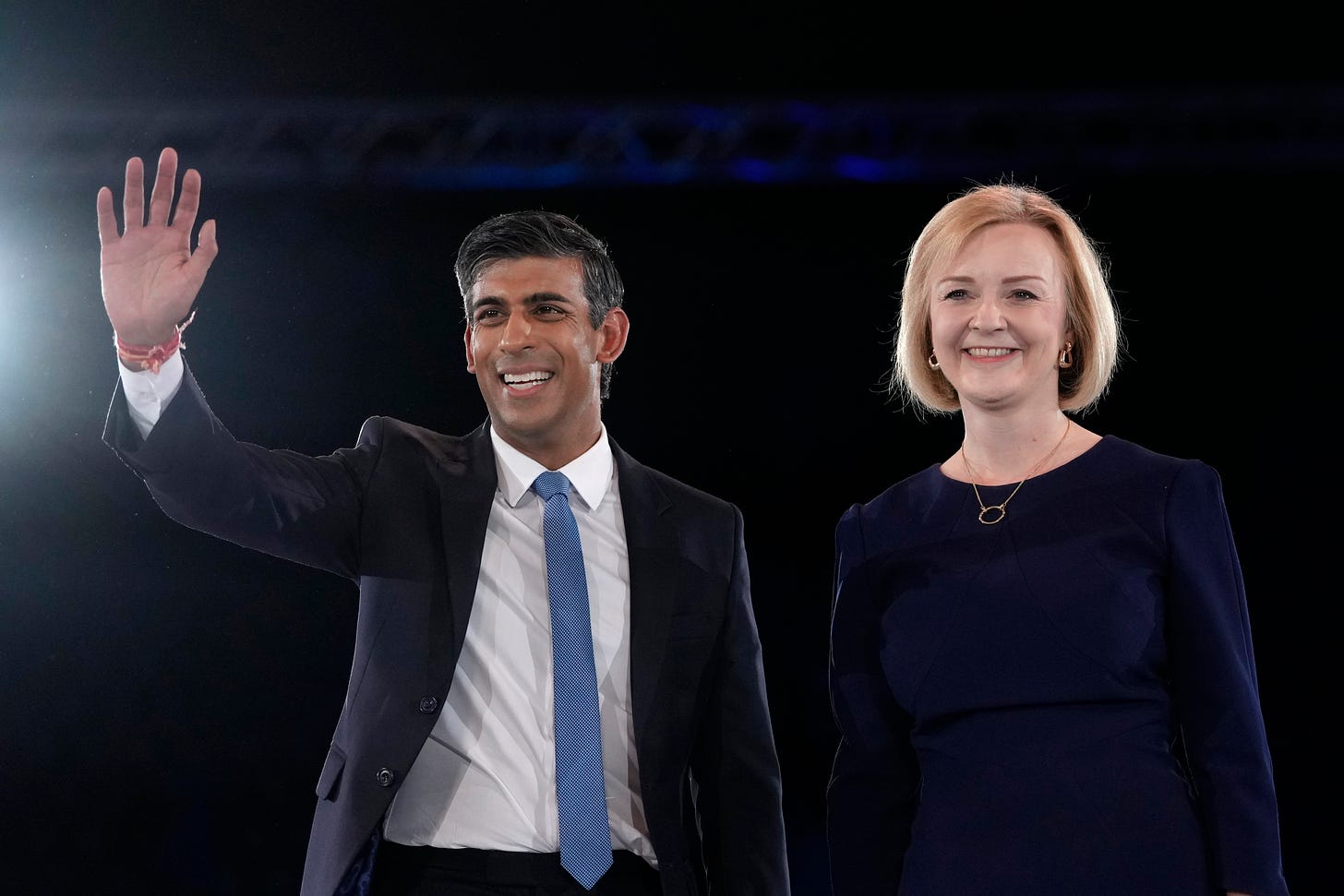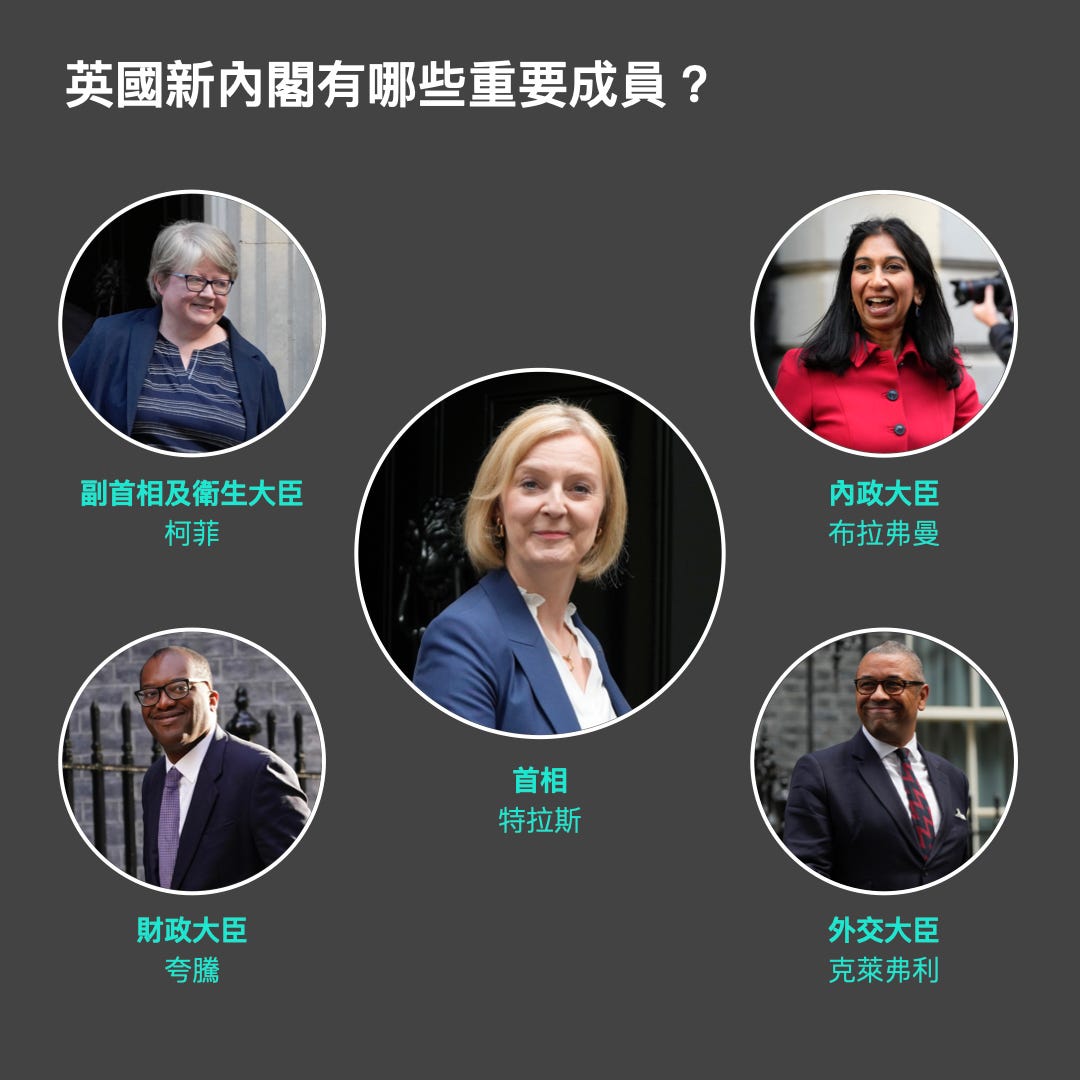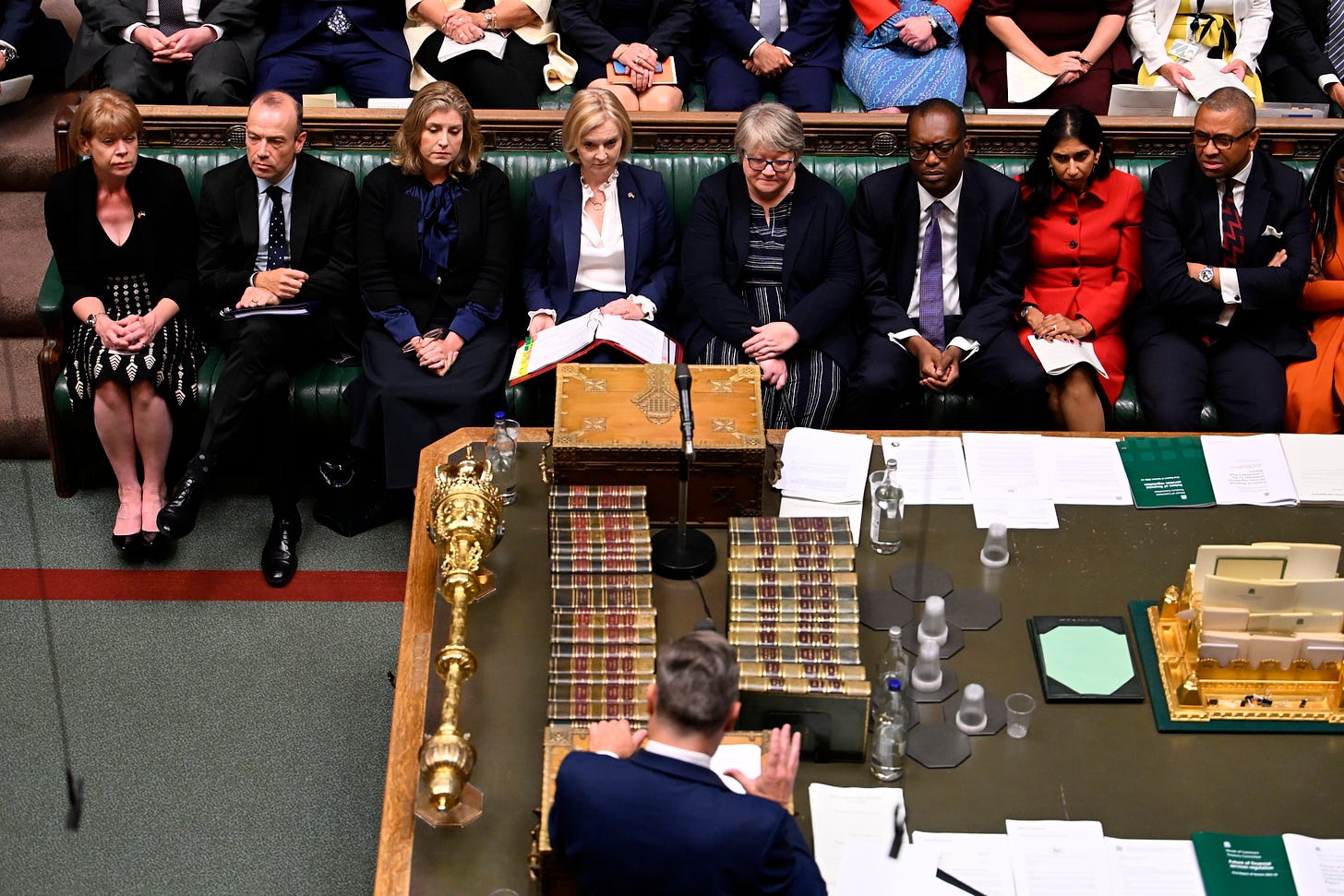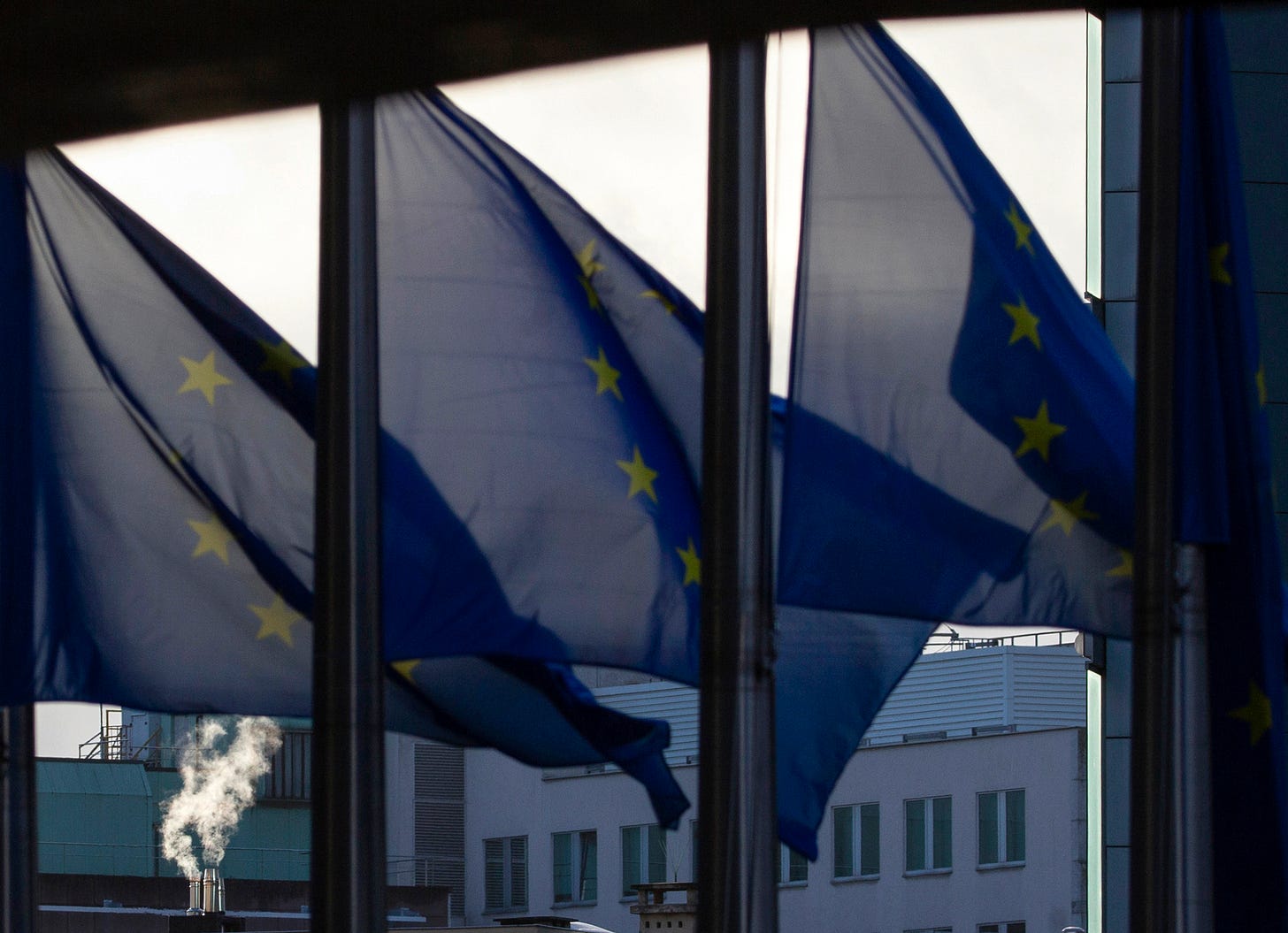Original link: https://sehseh.substack.com/p/724
On September 6, 2022, the new British Prime Minister Liz Truss delivered a speech in Downing Street. (AP)
Text / Xie Dawen
The rhythm of British politics has been odd this summer.
“Slowly, then suddenly” – a phrase used by many in British political commentary circles to describe the resignation of Prime Minister Boris Johnson. After more than two years of government crises, large and small, Johnson remained the prime minister; suddenly, a new scandal ignited the anger of Conservative MPs, and within three days he was forced to resign.
And the next leadership election, perhaps “suddenly, then slowly”. The Conservative Caucus quickly selected two candidates in less than two weeks for all Conservatives to vote. For the next two months, the entire political agenda remains stuck in the Conservative party process, even though Liz Truss is pretty much expected to win; at the same time, energy bills are about to go up dramatically, all the media Calling it a “crisis” and waiting for a response from Conservative politicians has made these two months extraordinarily slow.
How on earth did British politics fall into this bizarre timeline?
The World Walk has important stories you haven’t read yet. We focus on global issues from a gender perspective, complementing stories of dilemma, breakthrough, connection, and change that traditional power perspectives ignore.
Please pay a subscription to become our partner and walk with women around the world.
Before the election: Three storms that crushed Johnson’s cabinet
Other prime ministers have stepped down, if not because of losing elections, usually because they are not trusted by the party in major policy directions; however, Johnson’s resignation was because of integrity and ethical issues, which sparked anger from both the left and the right factions in the party. Although there are many scandals, big and small, the most crucial ones can be said to be three incidents: Paterson, Partygate , and Pincher.
“Paterson” (Owen Paterson) is a Conservative MP who was found to be illegal lobbying by an independent committee responsible for ethics issues in Parliament and recommended a suspension. In order to protect Paterson, Johnson used party discipline to ask party members to support him and give him a special opportunity to appeal. This act of setting things up because of people caused public anger, and finally fermented the “personality” issue that the opposition party had long advocated. In the subsequent by-elections, the Conservative Party even lost the original safe constituency because of this, and it also caused members of the party to question Johnson & Johnson. judgment ability.
“Party Gate” refers to the fact that during the British lockdown, the Prime Minister’s Office was reported to have illegally held a party, and there were absurd plots such as “staff dragging a large suitcase to the supermarket to buy alcohol”. This incident in itself is enough to spark public anger: under the epidemic, it is difficult for everyone to hold the funeral of their relatives, but there is a carnival in the Prime Minister’s Palace. For the first time, Johnson lied that he “never had a party,” and a few days later said, “People assured me there was no party”—and finally found out that Johnson himself had attended one at all, one of which was his birthday party. This incident made the voice of the party challenging the leadership of Johnson and Johnson clearly emerged, and even triggered a confidence vote in the party for a time.
On September 6, 2022, former British Prime Minister Boris Johnson delivered a speech in Downing Street before resigning. (AP)
The last straw was when Chris Pincher, the deputy chief whip, broke the forcible molestation. Everyone immediately questioned: This person has a reputation as a repeat criminal, why did Johnson & Johnson appoint him as the deputy chief whip? Faced with this thorny issue, Johnson chose to lie again, claiming to the public that “the Prime Minister has not heard the relevant allegations”, but later witnesses pointed out that the Prime Minister had accepted an oral report on Pincher’s sexual harassment case, and the Prime Minister’s Office responded to this, “The Prime Minister forgot”.
Johnson, who couldn’t justify himself, found himself unable to escape this time. Within three days, 50 MPs avalanche resigned from government positions, protesting against J&J’s leadership and preventing J&J from forming an effective government. After losing the trust of the parliamentary group and being forced into the palace, Johnson finally stepped down
Deviating from the sentiments of the people, a parallel universe-like intra-party election campaign
Then, eight Conservative MPs accepted formal nominations to run for party leadership and for the prime minister’s seat. In less than two weeks, the caucus quickly eliminated six candidates, leaving Rishi Sunak and Truss to be voted on by party members.
In this party election, the only important audience for Sunak and Truss is the about 170,000 Conservative Party members, not the general public. Perhaps because of this, the two-month election almost seemed to be a parallel universe, with candidates vying for favor with party members, but people’s most pressing issues could not be answered.
The most pressing issue in British society right now is the imminent rise in energy prices. Households’ annual energy bills are expected to rise by 80% this year, and will even triple next year to an average of £6,000 per household, compared with the median household income in the UK of £31,400. In other words, it is estimated that half of the households will spend more than one-fifth of their income on electricity and gas bills next year.
The newly elected Truss may not want to touch too difficult issues during the election campaign. He only vaguely said that he would help the people. In addition, he returned to the old tune of “it is better to cut taxes than to give money.” However, by cutting taxes alone, people with lower incomes will get less help, which is undoubtedly a drop in the bucket for most families – in the UK, even Conservative politicians have often claimed that their policies have helped in the past. The poor are the most, but Truss made it clear in a TV interview this time that she thinks it is not unfair to let the rich get more.
In this election campaign, the main policy controversy was “whether to cut taxes”: the keynote of Truss’ appeal to Conservative members is that she is a true “conservative”, constantly emphasizing that she will reduce various tax burdens, And insists that this will bring economic growth.
In response, critics keep asking: “You want to cut taxes, where will the money come from? Are you going to increase debt, or cut spending on public services? Will it make inflation worse?” Sunak also criticized Truss’s approach as “fairy-tale economics”.
The reason why Conservative Party members chose Truss is not only attracted by her small government policy, but also because of the sharp drop in Sunak’s political “share price” in the past six months. According to the party member polls in January this year, if the leader was re-elected at that time, Sunak may have won 64% of the votes against Truss. At that time, Sunak was the finance minister who led the epidemic relief policy and had a high reputation.
But from January to the present, Sunak was revealed to have held a US green card, and as a congressman, his wife actually avoided taxes as a “non-domicile”, which has strengthened people’s eyes. This person is too rich to be like us” image; and Sunak’s decision to raise taxes later to help bail out money also sparked dissatisfaction among some Conservatives (especially the right).
Perhaps the most crucial factor, however, is that there are still a large number of Johnson & Johnson supporters at the bottom of the Conservative Party, who are even more disgusted by Sunak as an indicator in the “avalanche resignation” – the poll points out that the “don’t like Sunak” Nearly half of Conservative Party members said that “resigning to force Johnson & Johnson to quit” was the main reason for their dislike of Sunak, ranking first among all reasons.
On the contrary, Truss not only successfully created an image of “speaking straight”, but also chose to stay in J&J’s cabinet, which can attract party members who still like J&J. In addition, during the election campaign, Truss also showed a tough rhetoric against the EU, and claimed that British society, especially the public service system, has a culture that is too “woke”, which is a speech to please some Conservative Party grassroots.
Another key point is that Truss has the support of the right wing of the party, and it is an interesting phenomenon that she can become a “representative of the right wing”: in fact, Truss supported Remaining in the EU in 2016 (in contrast, Sunak supported Brexit at that time), But after the referendum, Truss successfully reversed his image, constantly talking about the benefits of leaving the EU, and emphasizing that he dominated some post-Brexit economic and trade agreements during his tenure as trade minister. In this campaign, she has also successfully formed alliances with politicians on the right wing of the party.
In terms of policy, Sunak is decidedly on the right even by Conservative standards, but Truss’ profile and her choice of political alignment make her more supportive of the right.
After the election: The most minority right-wing cabinet in history
What’s the point of the new Truss government?
First, there is a price for Truss to woo the right wing of the party. She had to push right-wing kanban figures such as Suella Braverman and Jacob Rees-Mogg, and even make the former one of the most important Home Secretary in the cabinet, whose ability to govern , in the best way to say “limited experience, yet to be tested”, but that’s the price. On the other hand, the members of the centrist faction in the party are almost all frozen.
More broadly, this is a cabinet that “rewards supporters”, not one that is “inclusive and united”. Her opponent Sunak himself, as well as ministerial officials who had previously supported Sunak, were not renewed. Because of the severe division of the party, some people have publicly suggested that Truss should take into account unity when appointing the cabinet. Truss apparently did not take this suggestion.
However, only about one-third of caucus members chose her as the first choice for Truss in the parliamentary voting stage, and her support was quite weak. In the voting stage of party members, she also won with only 57% of the votes, the only one who has not broken 60% of the votes since the Conservative Party switched to direct election of leaders by party members. Such a cabinet excludes many capable and charismatic members from the government, and her fiscal and taxation policies are full of controversy within the party. Whether this will bring a crisis to her leadership is worth observing.
For the first time in British history, none of the four great offices of state are white men. (Drawing: Lin Tingwei / Photo credit: AP)
It is worth mentioning that this is the first time in British history that none of the four great offices of state are white men: the prime minister is a white woman, the treasurer and the foreign secretary are black men, and the interior minister is a South Asian woman. Health Secretary Thérèse Coffey is also the first woman to be appointed Deputy Prime Minister, and Wendy Morton is the Conservative Party’s first female chief whip.
After 2005, under the decision of then-leader David Cameron, the Conservative Party deliberately selected women and minority candidates for election, which can be said to show results in this cabinet. But the Conservatives’ tendency to go to private schools (mostly wealthy) remains unchanged, with nearly 70 per cent of the new cabinet being privately educated, similar to previous terms – only 7 per cent of the nation’s population is privately educated.
Internal affairs: energy, healthcare, regional balance, will tax cuts solve everything?
As for policy, Truss is in power now, and there are only about two years before the next election to prove himself, and there are still many urgent issues at hand, and the pace must be accelerated again.
First, as mentioned earlier, the issue of energy prices. On September 8 this year, Truss has stepped in strongly, lowered the increase , and let the government absorb the price difference first; this is similar to the plan proposed by the opposition party, the difference is that the source of funds proposed by the Labor Party is to levy windfall profits tax on energy companies, but The Truss government, on the other hand, should borrow to finance the increase in government debt.
This also became an important question in the Prime Minister’s first question on Wednesday: Labour leaders questioned why energy companies have grown significantly in profits this year. To this, Truss replied that she does not think tax increases should be made so as not to curb the growth of business investment. In any case, she believes in small government, and she may still have to choose the solution of big government, and it will cost a lot.
Britain’s Labour Party chairman Keir Starmer (back to camera) questions the new cabinet in parliament on September 7, 2022. (AP)
Public service is also a possible difficulty with Tesla’s small government route. During the election, Truss did not write much about policies such as medical care, but medical care has always been one of the top concerns of British voters: now, the number of people waiting for non-urgent treatment is as high as 6.7 million, and another 1.4 million people are in Waiting for psychiatric treatment, in addition, many hospitals are full, and people wait for ambulances to increase. With insufficient capacity, the health care system is likely to require additional investment.
In her inaugural speech, Truss said health care was one of her top three governance priorities, but she has so far offered no specific policy. In other words, Truss is slashing taxes while facing a number of issues that must be paid for (in addition to energy and public services, including her promised defense investments, etc.), which also makes critics worry about the government’s financial burden.
The “regional balance” policy is another important issue. In 2019, a major election promise of the Johnson & Johnson government was to invest more in former industrial towns in northern England that have long been underinvested. Such a promise, coupled with the Brexit factor, has enabled the Conservatives to win many of the Labour Party’s iron-voted areas in northern England. The new Conservative MP from Northern England, quite looking forward to returning to his constituency, said to voters: “Look! This is what the Conservative government is building here for us!”.
Although Truss still verbally supports the policy goal of regional balance, she, who is on the small government line, also expressed during the campaign that this goal should be achieved in a “conservative way”: such as regional deregulation or lowering. Taxes, not investment in construction or education. That could be quite a disappointment to Conservative MPs in northern England, not to mention that it could make those “voters who voted for Labour in the past and Conservatives for the first time” feel forgotten again.
Regarding the environment, Truss supported the statutory target of “2050 net carbon emissions” on paper, but announced the abolition of green energy taxes “for investment in renewable energy”, and opposed onshore wind power. He also said that solar energy on farmland The board is a “depressing” sight, apparently not particularly positive for green energy, but instead supporting increased oil drilling in the North Sea.
Diplomacy: Tough on China, trade war crisis with EU
Diplomatically, the direction of the Truss administration may not be much different from that of the Johnson administration, and will continue to assist Ukraine.
As for the attitude towards China that Taiwanese readers may be more concerned about, Truss can be regarded as a British politician who is relatively tough on China. Regarding the UK’s reliance on trade with China, she also stressed that Europe’s over-reliance on Russia cannot be repeated, and she supports holding the Chinese government accountable for the Xinjiang issue.
Regarding Taiwan, she has said that it should ensure that Taiwan has a way to defend itself. After Pelosi’s visit to Taiwan, in the face of China’s military exercises, she also formally summoned the Chinese ambassador as foreign secretary to “denounce” China’s “escalating tensions”.
In addition, the most thorny issue for the new government may be its relationship with the European Union.
During Brexit, the UK signed the Northern Ireland Protocol with the EU: after Brexit, checkpoints should have been set up on the border between Northern Ireland (UK territory) and Ireland (EU member state), but considering that Due to the particularity of the division of Northern Ireland’s national identity , the two sides agreed not to set up a “hard border”, but instead set up checkpoints at the Northern Ireland port to check the goods exported to Northern Ireland from other parts of the UK, and Northern Ireland should also Partially follows EU norms.
Some “unionists” in Northern Ireland (who agree that Northern Ireland belongs to the United Kingdom) believe that this agreement is equivalent to cutting Northern Ireland out of the United Kingdom and strongly opposes the agreement. For several months, the United Kingdom has intentionally broken the agreement unilaterally, by amending the law to establish a “green channel” between the United Kingdom and Northern Ireland that allows some goods to pass through checkpoints without inspection – this is also a policy direction strongly supported by the right wing of the Conservative Party. , so the Truss government is very likely to continue to promote this policy. Observers fear the move could spark a trade war between Britain and the European Union.
Overall, I personally don’t think Tesla’s abilities can be underestimated. Her ability to reinvent her own image from a relatively unknown political figure to the prime minister is a testament to her political ability; but at the same time, we should not underestimate the new prime minister. The challenge ahead: Getting through this harsh winter and proving herself within two years to convince the public that she is on the right track will be a daunting task for any prime minister. (Finish)
About the author | Xie Dawen (PhD candidate of the Institute of Social Sciences, National Taiwan University, likes complex history, clean data, and beautiful people.)
Subscribe to the Walk Around Newsletter and we’ll deliver:
[Members only] Go original: a good story that others have not written yet
An Evening News Every Day: A selection of daily news summaries for you
Weekly Newsletter: Good articles from around the world you may have missed
A Weekly Note: A Weekly Guide to Online Activities
【Exclusive benefits for other members】» See here
This article is reprinted from: https://sehseh.substack.com/p/724
This site is for inclusion only, and the copyright belongs to the original author.

